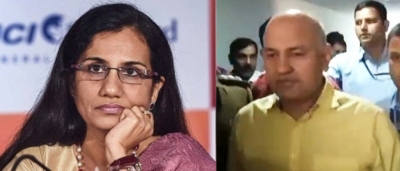New Delhi: The Central Bureau of Investigation (CBI), India’s premier anti-corruption agency, is facing criticism for its inability to bring cases related to high-profile scams to their logical end because of delayed investigations.
Take for instance the two cases that the CBI has filed against former Delhi Deputy Chief Minister Manish Sisodia in the Delhi excise policy scam and snooping case. The agency has made Sisodia the accused number one in both cases, but it is yet to file a chargesheet in either.
ICICI-Chanda Kochhar matter has also raised eyebrows, as the CBI filed the FIR in January 2019, two years after the preliminary inquiry into the case was initiated.
The CBI arrested former ICICI bank CEO Chanda Kochhar, her husband Deepak Kochhar, and Videocon group MD V N Dhoot in December 2022, five years after lodging the case. The delay in action has raised questions about the agency’s effectiveness. Recently the CBI has filed a chargesheet in connection with the ICICI-Videocon loan case.
Sushant Singh Rajput case: The CBI has failed to complete its investigation into the death of actor Sushant Singh Rajput, who passed away in June 2020 under mysterious circumstances. His body was found hanging from the ceiling fan of his rented accommodation in Mumbai. The CBI had recreated the crime scene but the investigation is still pending.
Arushi Talwar case: Arushi Talwar and domestic help Hemraj Banjade were murdered during the intervening night of May 15 and 16 in 2008. The case was handed over to the CBI in 2009. The Allahabad High Court acquitted the accused saying the evidence was not beyond reasonable doubt.
2G case: The CBI had failed to prove its case in the alleged 2G spectrum scam that cost the exchequer Rs 176,000 crore. Special Judge O.P. Saini, who oversaw the trial of all 2G spectrum cases since early 2011, had said in 2017 that his seven-year anticipation for evidence ended “all in vain” because the case was mainly based on “rumour, gossip and speculation”.
IANS
